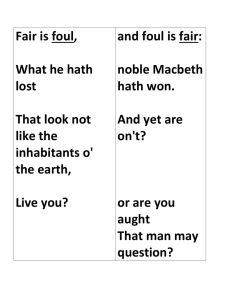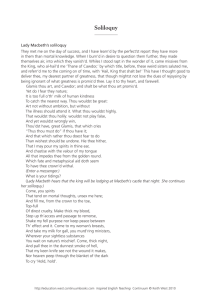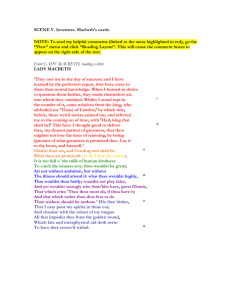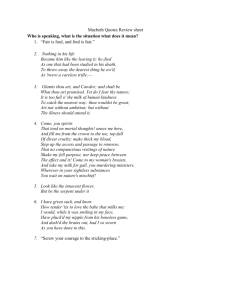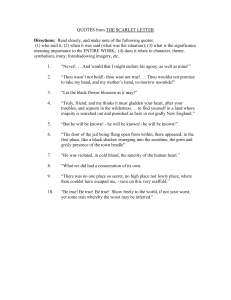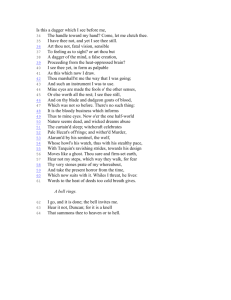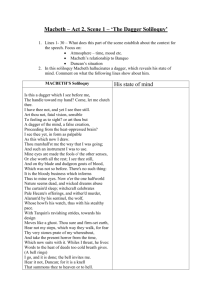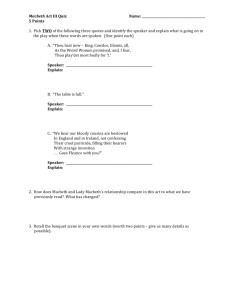AuditionMonologues 38KB May 13 2013 07:19:42 AM
advertisement
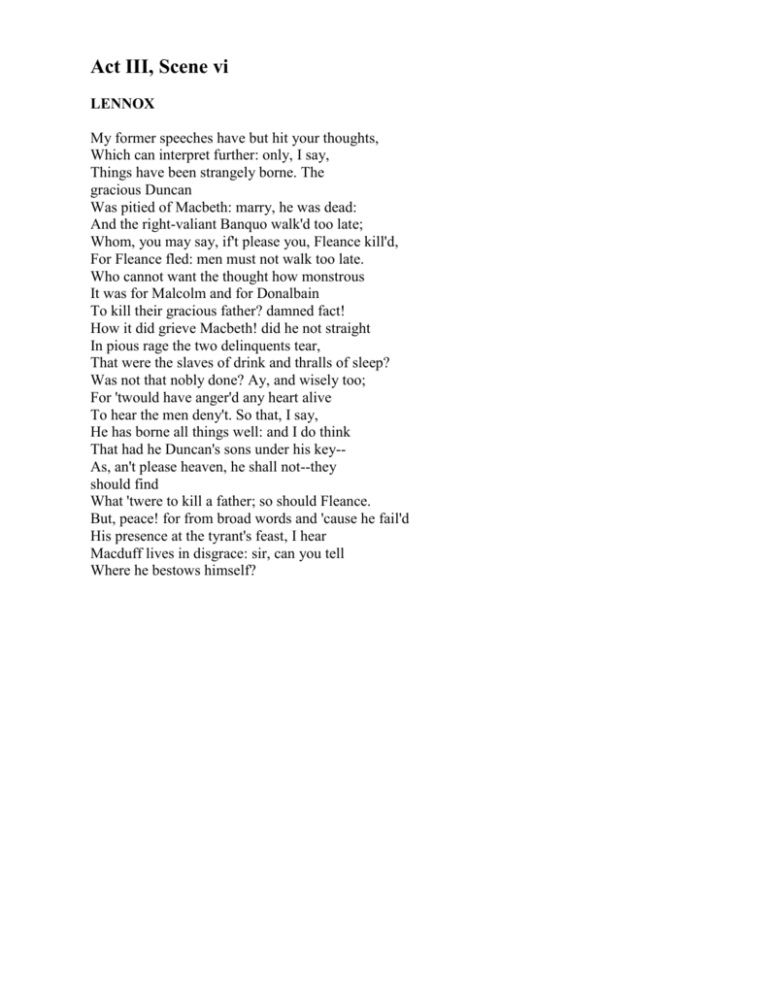
Act III, Scene vi LENNOX My former speeches have but hit your thoughts, Which can interpret further: only, I say, Things have been strangely borne. The gracious Duncan Was pitied of Macbeth: marry, he was dead: And the right-valiant Banquo walk'd too late; Whom, you may say, if't please you, Fleance kill'd, For Fleance fled: men must not walk too late. Who cannot want the thought how monstrous It was for Malcolm and for Donalbain To kill their gracious father? damned fact! How it did grieve Macbeth! did he not straight In pious rage the two delinquents tear, That were the slaves of drink and thralls of sleep? Was not that nobly done? Ay, and wisely too; For 'twould have anger'd any heart alive To hear the men deny't. So that, I say, He has borne all things well: and I do think That had he Duncan's sons under his key-As, an't please heaven, he shall not--they should find What 'twere to kill a father; so should Fleance. But, peace! for from broad words and 'cause he fail'd His presence at the tyrant's feast, I hear Macduff lives in disgrace: sir, can you tell Where he bestows himself? Act II, Scene iii PORTER Knocking within. Enter a Porter Here's a knocking indeed! If a man were porter of hell-gate, he should have old turning the key. Knocking within Knock, knock, knock! Who's there, i' the name of Beelzebub? Here's a farmer, that hanged himself on the expectation of plenty: come in time; have napkins enow about you; here you'll sweat for't. Knocking within Knock, knock! Who's there, in the other devil's name? Faith, here's an equivocator, that could swear in both the scales against either scale; who committed treason enough for God's sake, yet could not equivocate to heaven: O, come in, equivocator. Knocking within Knock, knock, knock! Who's there? Faith, here's an English tailor come hither, for stealing out of a French hose: come in, tailor; here you may roast your goose. Knocking within Knock, knock; never at quiet! What are you? But this place is too cold for hell. I'll devil-porter it no further: I had thought to have let in some of all professions that go the primrose way to the everlasting bonfire. Knocking within Anon, anon! I pray you, remember the porter. Act I, Scene vi MACBETH If it were done when 'tis done, then 'twere well It were done quickly: if the assassination Could trammel up the consequence, and catch With his surcease success; that but this blow Might be the be-all and the end-all here, But here, upon this bank and shoal of time, We'ld jump the life to come. But in these cases We still have judgment here; that we but teach Bloody instructions, which, being taught, return To plague the inventor: this even-handed justice Commends the ingredients of our poison'd chalice To our own lips. He's here in double trust; First, as I am his kinsman and his subject, Strong both against the deed; then, as his host, Who should against his murderer shut the door, Not bear the knife myself. Besides, this Duncan Hath borne his faculties so meek, hath been So clear in his great office, that his virtues Will plead like angels, trumpet-tongued, against The deep damnation of his taking-off; I have no spur To prick the sides of my intent, but only Vaulting ambition, which o'erleaps itself And falls on the other side. Act II, Scene i MACBETH Is this a dagger which I see before me, The handle toward my hand? Come, let me clutch thee. I have thee not, and yet I see thee still. Art thou not, fatal vision, sensible To feeling as to sight? or art thou but A dagger of the mind, a false creation, Proceeding from the heat-oppressed brain? I see thee yet, in form as palpable As this which now I draw. Thou marshall'st me the way that I was going; And such an instrument I was to use. Mine eyes are made the fools o' the other senses, Or else worth all the rest; I see thee still, And on thy blade and dudgeon gouts of blood, Which was not so before. There's no such thing: It is the bloody business which informs Thus to mine eyes. A bell rings I go, and it is done; the bell invites me. Hear it not, Duncan; for it is a knell That summons thee to heaven or to hell. Act I, Scene v LADY MACBETH The raven himself is hoarse That croaks the fatal entrance of Duncan Under my battlements. Come, you spirits That tend on mortal thoughts, unsex me here, And fill me from the crown to the toe top-full Of direst cruelty! make thick my blood; Stop up the access and passage to remorse, That no compunctious visitings of nature Shake my fell purpose, nor keep peace between The effect and it! Come to my woman's breasts, And take my milk for gall, you murdering ministers, Wherever in your sightless substances You wait on nature's mischief! Come, thick night, And pall thee in the dunnest smoke of hell, That my keen knife see not the wound it makes, Nor heaven peep through the blanket of the dark, To cry 'Hold, hold!' Enter MACBETH Great Glamis! worthy Cawdor! Greater than both, by the all-hail hereafter! Thy letters have transported me beyond This ignorant present, and I feel now The future in the instant. Act II, Scene i LADY MACBETH Glamis thou art, and Cawdor; and shalt be What thou art promised: yet do I fear thy nature; It is too full o' the milk of human kindness To catch the nearest way: thou wouldst be great; Art not without ambition, but without The illness should attend it: what thou wouldst highly, That wouldst thou holily; wouldst not play false, And yet wouldst wrongly win: thou'ldst have, great Glamis, That which cries 'Thus thou must do, if thou have it; And that which rather thou dost fear to do Than wishest should be undone.' Hie thee hither, That I may pour my spirits in thine ear; And chastise with the valour of my tongue All that impedes thee from the golden round, Which fate and metaphysical aid doth seem To have thee crown'd withal.
